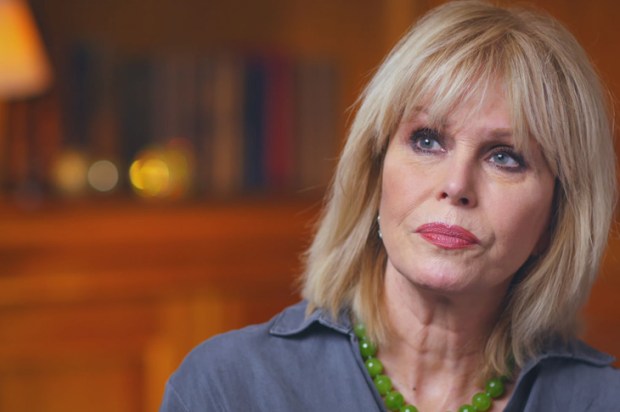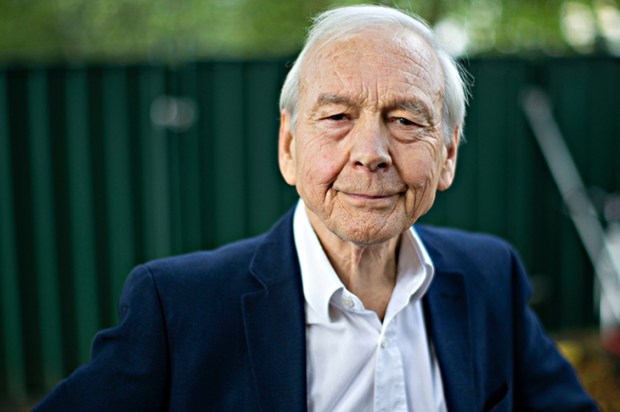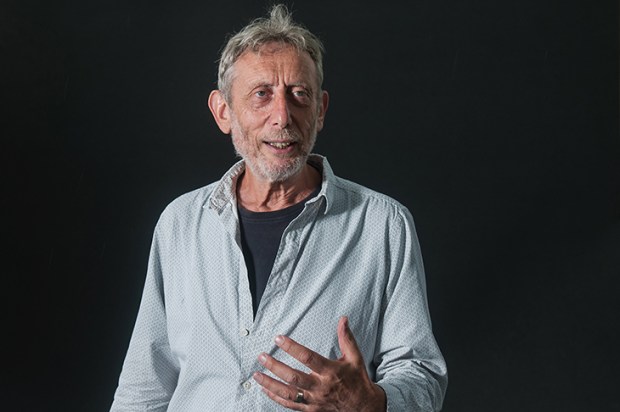How many listeners, I wonder, actually tuned in to Darkside as it went out on air on Radio 2, after dark, curtains closed against the pale moon waning? One listener for sure at 10 o’clock on Monday night was David Gilmour, Pink Floyd’s guitar man and co-creator of the band’s mega-successful ‘concept album’ The Dark Side of the Moon, which inspired the play. Gilmour told the playwright Tom Stoppard that he wouldn’t listen ‘until it was actually going out on radio’. He wanted to catch ‘the extra vibe’. He may be a rock superstar but he’s still in thrall to radio: ‘There it is being listened to at that moment by all those people.’
Stoppard agreed. ‘Dave’s on to something there,’ he told us on Front Row last week. ‘It adds something to the experience to listen to it while it’s going out on air.’ It’s true. There is a loss of impact when listening via iPlayer; as if the contacts are a bit fuzzy, not quite so crystal-clear. You lose a sense of immediacy, of instant communication between the voice on the air and the thoughts racing around in your head.
Stoppard (and it appears Pink Floyd’s guitar man) is a real radio man, appreciating the experience of being taken elsewhere on a soundwave. Wireless unleashes the mind in a way that’s very different from any of the visual media. It’s a bit psychedelic, in fact. When Radio 2 asked Stoppard if he would write something to mark the 40th anniversary of the album’s release in 1973, he was hooked immediately, relishing the chance to reflect in words the album’s strange, surreal quest for meaning. But then he discovered that Radio 2 reaches almost 15 and a half million listeners every week. ‘It’s really something to have a play which is going to be listened to by literally millions of people …As large as all my other audiences put together,’ he joked.
Darkside is Stoppard’s tenth play for radio. His first was broadcast in 1964. It’s a shame he hasn’t written more for radio because his love of wordplay and of taking the imagination into new dimensions works brilliantly on air. In Darkside he plays upon the album’s themes of what we’re here for, how small the earth is, fear of burn-out, catastrophe. ‘I didn’t try to make a story that was the album writ large,’ Stoppard told Mark Lawson. ‘I invented a little story in the spirit of the album.’
It’s quite a coup for Radio 2. Not just its first-ever original drama, but a first-class radio drama by Stoppard, who has not written for the stage for seven years. Darkside could only work on radio as there is no real story or theatrical dénouement, just episodes of dream life, explorations of meaning, linked by the music, which for the most part is played along as an undercurrent (Gilmour reassured Stoppard he would not be offended), bursting through at times as an echo to what has just been said.
At first all we hear is a pulse beating, then voices begin to crowd in, cash machines, clacking typewriters, laughter that soon turns to terrified screams. A train goes hurtling past. ‘Let me through. I’m a moral philosopher,’ declares Ethics Man (played by Rufus Sewell). We’re definitely in Stoppard territory here: turning on questions of moral authority, or rather authenticity. But we’re also in radio heaven: ‘It’s just tuning your mind to pick up the wave forms.’
Emily (played by Amaka Okafor) is studying moral philosophy at evening class but she also hears voices. In class they talk about thought experiments: the runaway train and the boy on the line, the private plane that’s about to crash with only one parachute on board, the fat man in a collapsing hot-air balloon. Who should be saved? Outside the classroom, Emily’s imagination, her voices, leads her to the ‘victims’ who complain to her about their fate: the boy hit by the diverted train, the fat man thrown out of the balloon, the banker and the politician denied the parachute.
Stoppard makes us stop and think. ‘We are natural-born to kindness. Which means to act is of our kind, as kin to kin, as kindred. Which is to act kindly,’ says Emily. Why, then, do we turn against nature, which then will turn against us? ‘We consume everything. We’re dying of consumption…The last fish is gasping beneath a floating island of plastic bags as big as France.’ In bursts Richard Wright’s keyboards and the lyrics of ‘Eclipse’, the last song on the album.
What’s the effect? It gives the album a whole new dimension. In return the music takes us to another place, giving Stoppard’s words much more impact. Why are we here? Why, if we’re conditioned to kindness, are we allowing the planet to be destroyed? What will happen if we don’t do something? A bit existential perhaps for late-night on Bank Holiday Monday but you had to be there.
Got something to add? Join the discussion and comment below.
Get 10 issues for just $10
Subscribe to The Spectator Australia today for the next 10 magazine issues, plus full online access, for just $10.
You might disagree with half of it, but you’ll enjoy reading all of it. Try your first month for free, then just $2 a week for the remainder of your first year.













Comments
Don't miss out
Join the conversation with other Spectator Australia readers. Subscribe to leave a comment.
SUBSCRIBEAlready a subscriber? Log in